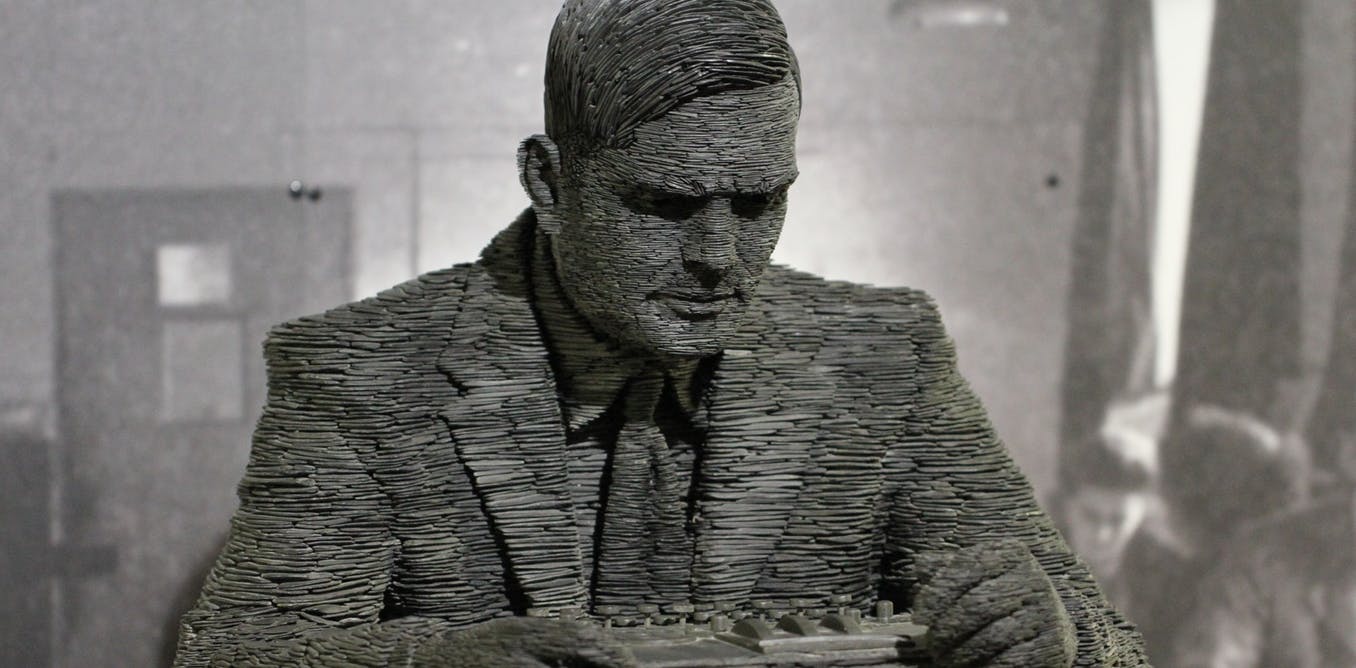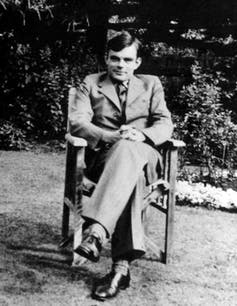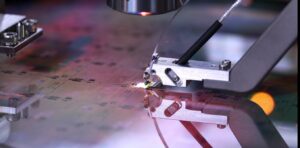Alan Turing: visionary, war hero and the only choice for the £50 note

Alan Turing statue at Bletchley Park. Duane Wessels/Flickr, CC BY-NC-SA
The Bank of England has decided that the next prominent figure to feature on the £50 note should be a scientist and have put the call out for nominations from the general public. For me, there is one scientist who stands out above all the rest. Forget Hawking or Sanger, Lovelace or Hodgkin. I give you a war hero, a pioneer of the computer age, a martyr of the LGBT community and the forerunner of a whole field of science: I give you Alan Turing.
Turing, is probably best-known for his pioneering codebreaking work during World War II (featured in the Hollywood blockbuster The Imitation Game). Turing made the first breakthroughs into the German naval Enigma code, which eased the passage of allied ships across the Atlantic. He was also instrumental in creating a machine called the Bombe, an early forerunner of modern-day computers that could routinely crack Enigma. Turing’s war work, for which he was awarded the OBE, saved countless lives and is conjectured to have significantly shortened the war.
Astonishingly, this was perhaps not even Turing’s most influential contribution to modern civilisation, and was certainly not his first. When he was at Cambridge, in 1936, Turing tackled a famous, and unresolved, mathematics challenge known as the “decision problem”. In resolving the problem, Turing proposed a universal machine that could decide whether any given mathematical problem was provable or not.
In the universal machine, Turing introduced the idea of the stored programme computer years before such machines existed. Over a decade later, electronic technology had become sufficiently advanced to allow Turing’s ideas to make the leap from his brilliant mind into the real world. Although no one person can claim to have invented the computer, the descendants of Turing’s theoretical machine sit in billions of offices, homes and pockets around the world.
The maths of life
During his short academic career, Turing made towering contributions to a diverse range of areas, from pure mathematics to the theory of artificial intelligence. In 1952, aged 40, Turing wrote a lesser-known paper in a new area, which was no less brilliant than his preceding work. In The Chemical Basis of Morphogenesis, Turing proposed a mechanism by which patterns might form in the early embryo known as “diffusion-driven instability”.
The same mechanism, he realised, might account for a multitude of patterns in nature including those seen on animal coats, suggesting a mechanism for how the leopard got its spots. In particular, Turing’s theory predicts that animals can have spotty bodies and stripy tails, but not the other way around, a prediction that is borne out in many species of animals.

Spotty body, stripy tail.
Africa Wildlife/Shutterstock
Turing’s idea of using mathematics to untangle the secrets of life were highly influential in the development of the relatively new field of science called “mathematical biology”. At the heart of this rapidly growing subject is the attempt to represent biological systems of interest mathematically or computationally using models.
Today, Turing’s legacy – the idea of taking a quantitative approach to biology – is helping to unravel some of life’s most enigmatic mysteries. Mathematical biologists are attempting to understand how things can go wrong during the development of an embryo and to suggest the best way to tackle outbreaks of deadly diseases like Ebola.
A gross injustice
In 1951, Turing was elected a Fellow of the Royal Society. The great honour is conferred on only the most eminent scientists. With it came recognition and respect from wider society, with no hint of the distress and humiliation this same society would inflict upon him the following year.
Turing was a gay man in a time when, in the UK, it was illegal to be gay. In 1952, he was charged with “gross indecency”. At his trial, Turing pleaded guilty, insisting that he saw nothing wrong with his actions. He was duly convicted and offered the choice between prison or probation with a course of the hormone stilboestrol for a year: a so-called “chemical castration”.

Appallingly treated.
Wikimedia Commons
The “treatment” was designed to reduce libido and had the effect of rendering Turing impotent and causing him to grow breasts. If this were not humiliation enough, his conviction also meant that Turing’s security clearance was revoked. As a consequence, he was barred from continuing the consultancy work for Government Communication Headquarters that had grown from his war-time codebreaking successes.
On June 7, 1954, Turing died of cyanide poisoning. Next to his bed lay a half-eaten apple. It was speculated (since Snow White was one of Turing’s favourite fairy tales) that he had laced the fruit with cyanide before consuming his own “poisoned apple”. The inquest into his death recorded a verdict of suicide.
Read more:
Dorothy Hodgkin: Britain’s only female Nobel scientist deserves to be on the new £50 note
In 2009, then prime minister Gordon Brown, apologised on behalf of the British government for the appalling way Turing was treated and in 2013 Turing received a posthumous royal pardon. In 2017, the Alan Turing law came into force, retrospectively pardoning all men convicted of “gross indecency” for acts no longer considered offences.
In light of his war heroism, his scientific prowess, his technological foresight, his far-reaching computational influence and his stoicism in the face of injustice, the question is not “Why should Alan Turing feature on the new £50 note?” but rather, “How can we ignore this British icon any longer?”

Christian Yates does not work for, consult, own shares in or receive funding from any company or organisation that would benefit from this article, and has disclosed no relevant affiliations beyond their academic appointment.







